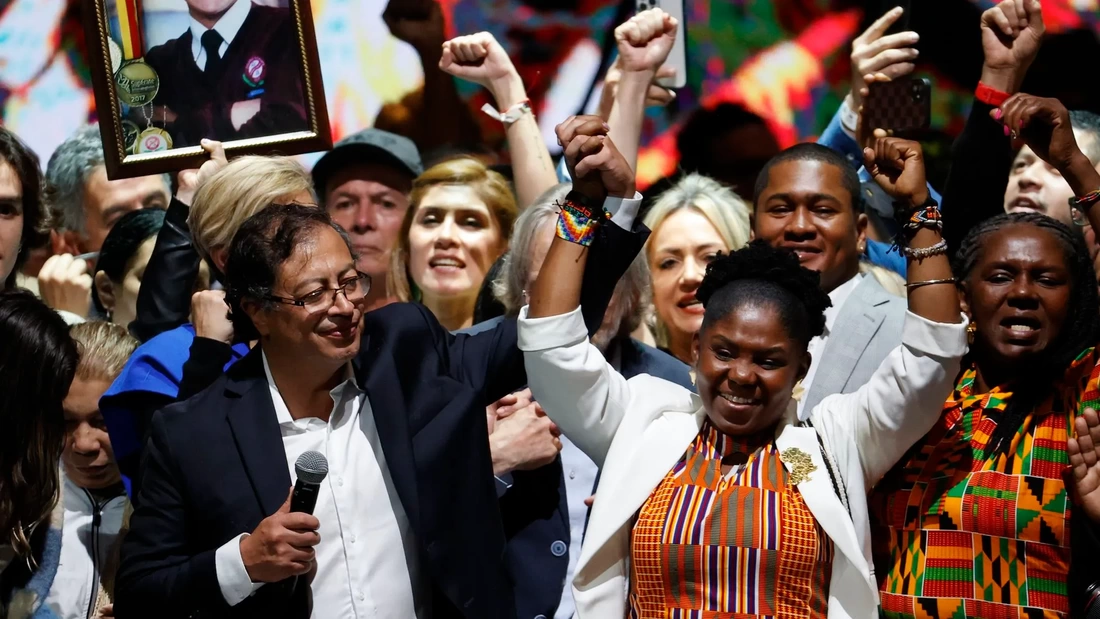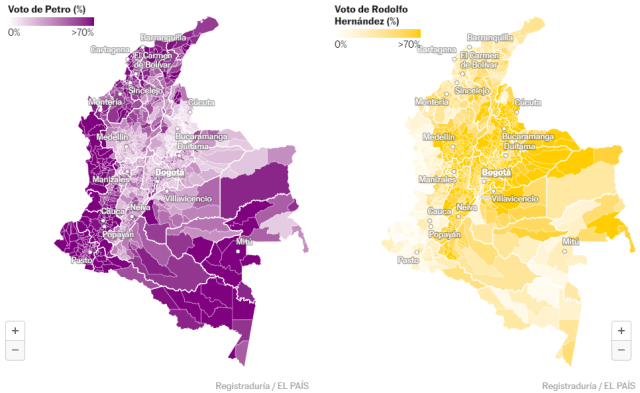|
President-elect Gustavo Petro celebrates victory with his vice presidential running mate, Francia Márquez. Photo: Mauricio Dueñas Castaneda/EFE.
What polls predicted in recent weeks has been fulfilled: Gustavo Petro is the president-elect of Colombia. The Historical Pact (PH) coalition achieved an unprecedented victory for a progressive political formation in a country undermined by the violence of a social and armed conflict spanning several decades.
Alongside Petro, the first Afro-Colombian woman from the working class to reach the vice presidency, Francia Márquez, brought in support from various grassroots sectors, including those that have been historically excluded from the political process. This political ticket undoubtedly contrasts with the figures who have dominated Colombia’s government during 200 years of its republican history (after the separation from Gran Colombia), as Márquez referred to in her speech this Sunday, June 19. In the first electoral round, on May 29, PH obtained 8.53 million votes (40.3% of the total). In the second round, this rose to 11.3 million (50.4%), an increase of about 2.75 million in its favor. The League of Anticorruption Governors (LIGA) party, led by Rodolfo Hernández and Marelen Castillo, received 5.95 million votes in the first round (28.2% of the total). For the second round, this rose by 4.63 million to reach 10.58 million (47.3%). The support of other candidates who did not advance to the second round was significant for Hernández and Castillo, yet was insufficient to reverse a very clear trend in favor of PH. It should be noted that Uribismo in its entirety did not come out to vote in favor of LIGA, if we take into account that the Federico Gutiérrez-Rodrigo Lara duo had achieved 5.58 million votes in the first round. The apparent abstention by supporters of the Democratic Center and other parties allied with Uribismo paved the way for the victory of Petro and Márquez. Voter turnout was 54.9% in the first round and 58.1% in the second. PH strengthened its support while the Colombian establishment media, such as Revista Semana, clearly tried to cover the presidential campaign in a manner biased against Petro and Márquez.
Periphery and polarization
Another important fact to highlight lies in the high PH vote in the departments of the Pacific, the poorest areas of Colombia, where the population is victimized of a greater degree of narco-paramilitary violence, and where the “armed strike” of the Clan del Golfo occurred in early May.
In Chocó, PH received 81.9% of the vote, in Valle del Cauca 63.9%, in Cauca 79%, in Nariño 80.9%, in Putumayo 79.7%, and in Amazonas 54.6%. In the departments of northern Colombia (Córdoba, Sucre, Bolívar, Atlántico, Magdalena, and La Guajira), PH obtained more than 60% of the votes, except in Cesar, where it received 53%. PH also achieved a high number of votes in Vaupés (74%) and Guainía (52.5%), in the southeast of the country. In Bogotá, it obtained 58.6%.
Map of Colombia according to the votes of the second presidential round (Photo: El País)
The image above is clear: where the Colombian right and extreme right have dominated, PH’s candidates did not make a dent, but there was great support for PH where social and armed conflict and criminal economies prevail, except in Antioquia, Arauca, Norte de Santander, Caquetá, and Guaviare.
This in itself reveals a polarized political landscape, which will lead to challenges due, in addition, to a fragmented Congress, in which PH will seek to seal alliances built during the electoral campaign. Social and economic programs that PH intends to apply will most likely be counteracted by a parliament in which politicians of the traditional Colombian establishment stand out, affected by ideology as well as oligarchic and Uribista interests. This polarization is only increased by the narratives deployed by hegemonic local media and the propaganda apparatus, which had already chosen their sides prior to the campaign—they had backed the opposition. Petro-Márquez’s policies regarding historic violence and insecurity, tax issues, and the productive economy, among other issues, will be presented in a controversial light by the media and debated loudly in Congress, because the proposals of PH differ critically from government actions during the last two decades of Uribismo. A crucial issue is that of compliance with the peace agreements signed in 2016, sabotaged by the presidency of Iván Duque and his political and media acolytes. In addition, the proposal to hold talks to end the armed conflict with the National Liberation Army (ELN), the main active guerrilla group, would complete a cycle of aspirations for peace and security that the opposing sides will not want to see resolved. According to a report by the Peace and Reconciliation Foundation (Fundación Paz y Reconciliación, or PARES), 37% of Colombia is affected by the presence of armed groups, both guerrillas and narco-paramilitaries. Due to the “strengthening” and “expansion” of this in the last four years of the Uribista government, the challenge regarding peace and security in Colombia is of historical dimensions, after seven decades of conflict supported by the state. In his speech as president-elect, Gustavo Petro emphasized a desire to carry out a “great national agreement” with various sectors to achieve significant progress in the social, economic, political, and environmental proposals of PH. In addition, he invited his political opponents to dialogue with PH. Medium and long-term reactions of his opponents remain to be seen. International relations and the South American landscape
Petro had announced in advance that his government would resume relations with Venezuela, broken since 2019, in the diplomatic and commercial fields.
The initiative must come from the Casa de Nariño [the seat of Colombia’s presidency], since the government of Iván Duque destroyed all cooperation with Miraflores Palace due to Colombia’s support for the United States’ “Guaidó Project.” Bogotá has been accused on multiple occasions of having collaborated in regime-change operations against the government of Nicolás Maduro, including the so-called Battle of the Bridges in 2019, and Operation Gideon in 2020. In addition, Colombian territory has served as a refuge and conspiracy headquarters for fugitives from Venezuelan justice escaping crimes related to politics, economy, and security, such as Julio Borges. Therefore, PH has an immediate task that would change the way in which Colombia carries out its international relations. However, the fact that Colombia has close ties with the foreign and military policy of the United States is not compatible with the high expectations held by some progressive sectors in Our America, regarding the new Colombian presidency. Although Petro and Márquez represent a left welcomed by other South American personalities of the same political-ideological tendency, such as Lula da Silva (Brazil), Luis Arce (Bolivia), and Xiomara Castro (Honduras), polarization and challenges to the governability of Colombia play a preponderant political role that cannot be underestimated. The economic-financial-commercial, military, and geopolitical agreements between Bogotá and Washington cannot be damaged without there being a significant shakeup by the coming Petro administration, especially considering that Colombia is a NATO “global partner”—not to mention the interests of local groups that are openly in favor of good relations between the United States and Colombia. The steps that the new administration will take regarding relations with Cuba, Nicaragua, and Venezuela will be the turning point (if there is to be one) regarding PH’s foreign policy, in a scenario where it is intended to politically and ideologically isolate the core countries of ALBA-TCP, CELAC, and UNASUR as a different left (“the troika of tyranny,” as they were baptized by US warmonger John Bolton), distinct from the “new progressivism” represented by Alberto Fernández, Gabriel Boric and Gustavo Petro himself. AuthorMisión Verdad is a Venezuelan investigative journalism website with a socialist perspective in defense of the Bolivarian Revolution
This article was republished from Orinoco Tribune. Translated by Orinoco Tribune.
ArchivesJune 2022
0 Comments
Leave a Reply. |
Details
Archives
July 2024
Categories
All
|


 RSS Feed
RSS Feed